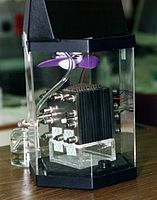
Photo from wikipedia
Abstract Biodiesel is one of the renewable fuels which is similar to diesel fuel. Biodiesel fuel has more oxygen than diesel fuel and this leads to better combustion and thereby,… Click to show full abstract
Abstract Biodiesel is one of the renewable fuels which is similar to diesel fuel. Biodiesel fuel has more oxygen than diesel fuel and this leads to better combustion and thereby, decreases PM, CO, and UHC emissions. On the other hand, biodiesel has a higher viscosity and density than diesel fuel which increases the BSFC, NO x and smoke emissions. One of the ways to solve this problem is using catalysts in the fuel which decreases the viscosity and density of the blend and as a result reduces the smoke and NO x emissions compared to the diesel fuels. Carbon nanotubes are one of the nanoparticles which due to their unique properties such as aspect ratio (length-to-diameter ratio), mechanical strength and high thermal and electrical conductivity are considered as a topic of interest by researchers. Due to their hydrophobic surface, carbon nanotubes tend to accumulate. For better dispersion in solution, their surface is amended with different functional groups. In this study, the diesel–biodiesel fuel was prepared with 5% biodiesel and 95% diesel. The MWCNTs-OH with concentrations of 30, 60, and 90 ppm were mixed with bio-ethanol-based solution at concentrations of E4 and E8. The performance and emissions were recorded at the engine speeds of 1800, 2100, and 2400 rpm and full load. The results showed that, addition of the additive to diesel+biodiesel+ethanol blends (B5+E4 and B5+E8) improved the torque and power and decreased the BSFC. The emissions of UHC and CO also decreased but NO x emission increased.
Journal Title: Energy Reports
Year Published: 2020
Link to full text (if available)
Share on Social Media: Sign Up to like & get
recommendations!